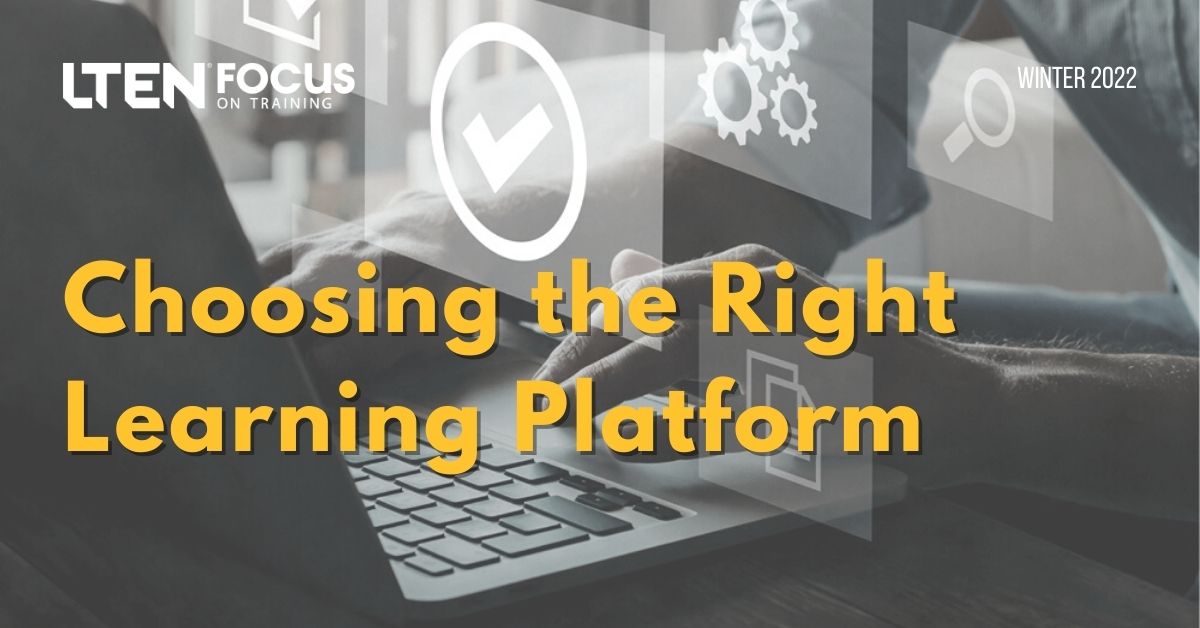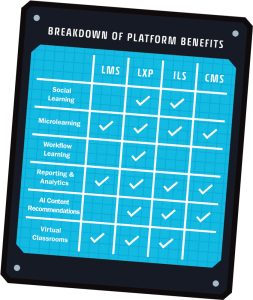
 Choosing the Right Learning Platform
Choosing the Right Learning Platform
Technology – By Steve Owens
It’s important to understand the different platforms.
Employees are changing roles, changing processes and reskilling more quickly and fluidly than ever before. To meet these needs, many leaders are working to understand what learning technologies will best support the employee experience, while adding measurable value to the business.
With many innovative learning platforms available on the market for a variety of use cases, it can be challenging to decide which platform type will serve your company best. Although a single platform may not meet all learner needs, it’s important to understand how different platforms can improve a company’s learning ecosystem and overall productivity.
From learning management systems and learning experience platforms to integrated learning systems and sales enablement platforms, here is a breakdown of what each of these platforms provides and considerations for selection.
 Learning Management Systems (LMS)
Learning Management Systems (LMS)
Probably the platform most familiar to organizations. They are traditional administrative-driven digital training platforms designed to house, deliver and track a company’s training content. An administrator oversees the content that is served up to end users through the LMS user interface. Thus, users’ learning experiences are curated by the administrator managing the LMS.
These platforms are essential in compliance focused organizations that have complex assignment business logic and reporting requirements. They are sometimes standalone, but often bundled as part of an organization’s broader human capital management (HCM) platform.
Big players in standalone LMS include Absorb, Cornerstone/Saba, Docebo and SumTotal, while common HCM platforms with a bundled LMS include SAP Success Factors, Workday and Oracle.
Learning Experience Platforms (LXP)
These are newer to the enterprise learning ecosystem. They provide a consumer-grade, social and personalized online learning experience that involves delivering content across multiple digital touchpoints.
The content is curated for each end user, typically using artificial intelligence, based on their unique roles, goals and skills. Because LXPs place an emphasis on the user-directed learning process, they enable users to explore their interests, discover learning opportunities, contribute content and interact with other users.
These platforms are typically used by employees of large enterprise companies and are ideal for employee-driven learning.
Big players in LXP include Degreed, EdCast, Fractal LXP and Learn Amp.
Integrated Learning Systems (ILS)
These systems offer users the best of both worlds. They provide the functionality of an LMS and LXP in a single platform using a single user interface for all forms of learning as well as a single data system for reporting and analytics. Many ILS products also have built-in content development capabilities and offer content from third-party companies already integrated with the platform. The ability to operate on a single platform can save companies time and money.
These platforms are ideal when balancing self-directed learning discovery with defined learning paths or compliance requirements.
Big players in ILS include CrossKnowledge, Fuse Universal and Valamis. As mature LMS providers expand their LXP-style offerings, we’ll see this list expand.
Content Management Systems (CMS) and Sales Enablement Platforms
These platforms focus less on the learning experience and more on the content, usually for business development. They provide visibility across the sales content lifecycle and close the loop between marketing, sales and customers with powerful search, scoring and syncing capabilities.
These platforms are ideal for helping teams track content performance from publication to pitch, although they vary in focus, with some offering strong training, coaching and performance capabilities and others providing an emphasis on document management and measurement.
Big players in CMS and sales enablement include Bigtincan, MindTickle, Seismic and Showpad.
Conclusion
With many innovative learning platforms available on the market for a variety of use cases, it can be challenging to decide which platform type will serve your company best. Although a single platform may not meet all learner needs, it’s important to understand how different platforms can improve a company’s learning ecosystem and overall productivity.
Steve Owens is a principal consultant at TiER1 Performance. He can be reached
at st.owens@tier1performance.com.








